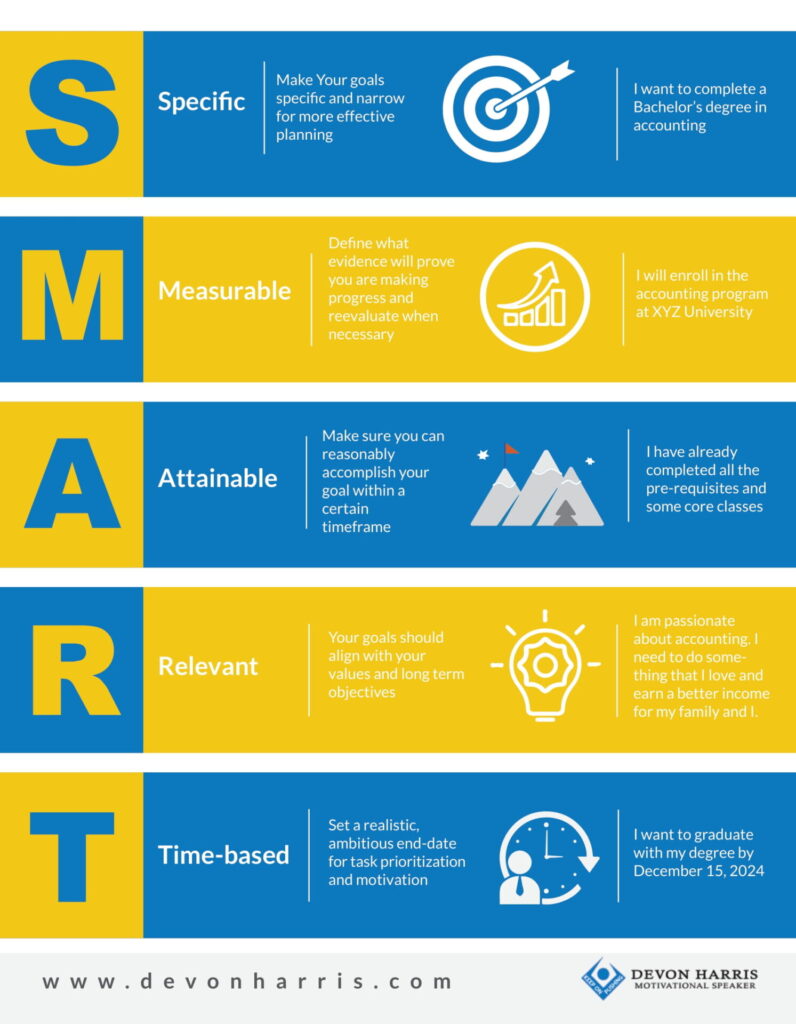
Author and speaker, Norman Vincent Peale once said “All successful people have a goal. No one can get anywhere unless he knows where he wants to go and what he wants to be or do.”
The importance of setting goals for your life cannot be overemphasized but it is also important to make sure your goals are clear and reachable. One of the best ways to do that is to set SMART goals.
In my ebook, GOALS: How To Set And Achieve Them, I take readers through the five elements of setting SMART goals. These elements will help you to build a measurable goal that encompasses exactly what needs to be accomplished and by when. The process will let you know when you’re successful. This approach eliminates generalities and guesswork, sets a clear timeline, and makes it that much easier to track progress and identify missed milestones.
SMART is an acronym that stands for Specific, Measurable, Achievable, Relevant and Time-bound. Each element of the SMART framework works together to create a goal that is carefully planned, clear and trackable.
Specific
Our knowledge and familiarity with the desires and aspirations we’ve been thinking about for so long can give us the false sense that we are actually specific about what we want when we are in fact not.
Lack of clarity results in a lack of focus on your objectives causing you to jump from one goal to the next
A specific goal answers questions such as:
- What needs to be accomplished?
- Who’s responsible for it?
- What steps need to be taken to achieve it?
Measurable
How will you know when you have achieved your goals?
You have to be able to measure them.
The metrics (time, money, weight, etc) you use make the goal more tangible and allow you to gauge your progress.
Being able to gauge your progress helps you to stay focused, meet your deadlines, and feel the excitement of getting closer to its achievement. Regardless of how long it will take for your goal to be accomplished, you can set milestones by considering specific tasks to accomplish.
Achievable
Is your goal a pie-in-the-sky fantasy or is it truly achievable?
Is this something you could actually accomplish given the knowledge, experience, and other resources that you have?
This can be a tricky needle to thread because your goals must be BIG. They must be challenging enough to cause you to stretch beyond your comfort zone but not so big that you are left feeling frustrated and let down by your lack of progress – the opposite of what you want.
Relevant
There are going to be many shiny objects and projects that you could be working on, but you shouldn’t be spending time on. The idea is not to set and pursue goals just for the fun of it. You want to add value to your life so make sure there is a real benefit attached to reaching your chosen objective.
In short, your goals should be relevant. They should make sense for you personally, for your career or your business. It should align with your values and larger, long-term goals.
Time-bound
The final component of SMART goals is that they need to be time-bound. Good goals don’t stretch into infinity – they have a deadline. The deadline creates positive pressure and a sense of urgency.
This aspect of the SMART goal criteria helps to prevent everyday tasks from taking priority over your longer-term goals. Without a target date, your goal remains open-ended resulting in procrastination, excuses and your goals being pushed aside
Keep On Pushing!

